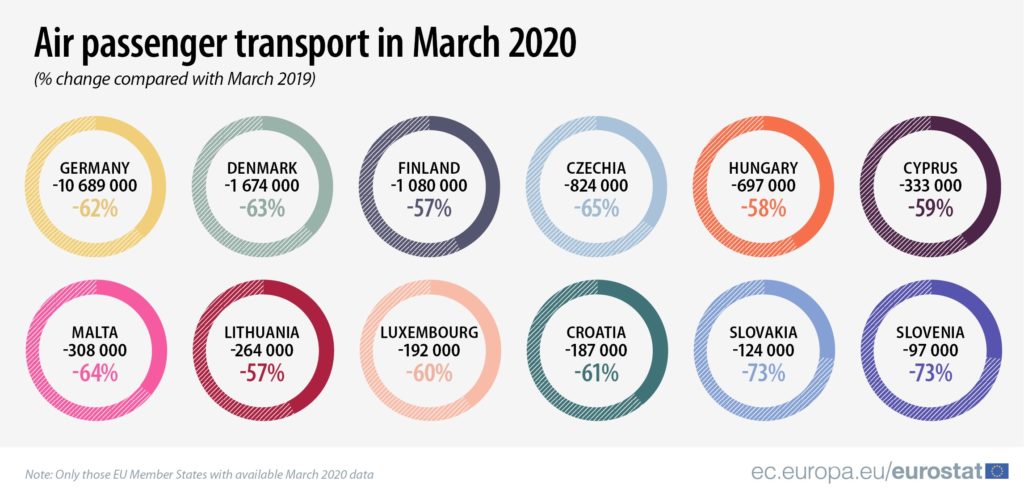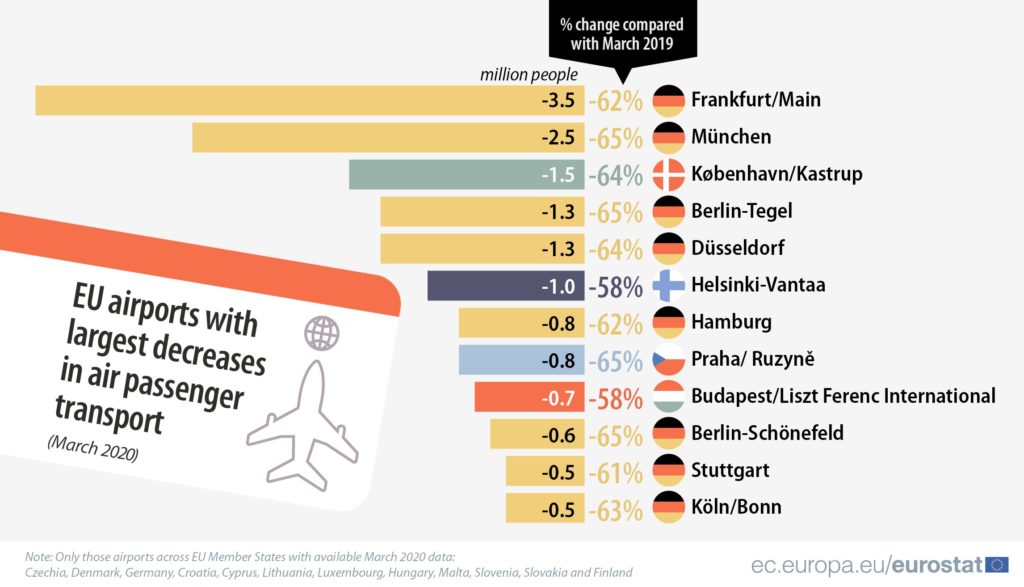To prevent the spread of the COVID-19 pandemic, countries around the world have taken a variety of restrictive measures.
First 2020 numbers already show their significant impact on air transport for all 13 EU Member States according to an analysis conducted by the European Statistical Office (Eurostat): Czech Republic, Denmark, Germany, Croatia, Italy (see country note), Cyprus, Lithuania, Luxembourg, Hungary, Malta, Slovenia, Slovakia, and Finland.
Prague Airport is one of the most negatively affected airports in Europe: the number of passengers fell by more than 800,000, amounting to a drop of 65 percent year-on-year.

Prague Airport, together with Berlin’s Tegel and Schönefeld airports and Munich Airport, showed the largest percentage decrease when it comes to passengers handled. All four hubs had about 65 percent fewer travelers in March.
However, when considering absolute numbers, the number of passengers fell the most in Frankfurt by a total of 3.5 million.

“None of the dozen EU airports shows a deeper percentage drop in the numbers of checked-in passengers than Prague’s airport,” said economist Lukáš Kovanda from the Czech Fund.
He also added that in January and February of this year, the number of passengers handled at Prague Airport was higher year-on-year, exceeding the value of one million in both months.
Whilst the number of air passengers in some of these EU Member States started to decrease already in February 2020, the number of passengers at least halved in all of them in March 2020.
Compared with March 2019, the largest decreases in numbers of passengers were observed in Italy (-85%, -11.9 million (see country note)), Germany (- 10.7 million passengers carried, -62%), Denmark (-1.7 million, -63%), Finland (-1.1 million, -57%), Czechia (-0.8 million, -65%) and Hungary (-0.7 million,
After reducing emissions, eliminating noise and protecting groundwater and surface waters, Václav Havel Airport is embarking on a new environmental protection program. It aims to reduce the consumption of disposable plastics in the airport environment as much as possible and to encourage passengers to consume this kind of plastic as little as possible.
For our company, plastic products are becoming an increasing issue to fight against. Even if we now completely stop the production of all plastics and their products, they will still be a problem for many generations to come.
According to a study published in 2017 in the prestigious science journal Science, we have managed to “enrich” our planet by 8.3 billion tons of plastics, whose collection, recycling and subsequent disposal will be a big problem. Moreover, the production rate of plastics remains high and if we do not significantly reduce it, we can be overwhelmed with up to 34 billion tons of plastics in 2050.
This scenario not only stresses out many but also begins to affect many businesses and governments that try to avoid it. This is evident by the recent decision of the European Union to definitively ban the use of disposable plastics, which are one of the most problematic forms of plastic products. It wants to say goodbye to Václav Havel Airport nowadays in the new program Plastics No Longer.
“Although the European Parliament has approved a ban on the use of disposable plastics only since 2021, Prague Airport is already launching its own initiative and will gradually put into practice concrete measures to reduce disposable plastics. The aim is, among other things, to motivate passengers to reduce their environmental impact and to travel with, for example, reusable beverage bottles or to dispose of beverages in disposable plastic bottles prior to a security check but to empty them and use them again,” said the Director of Prague Airport Environmental Protection.
In the fight against plastics, Prague Airport joins other airports around the world, including San Francisco. This completely banned the sale of water in plastic bottles at the terminal, which is one of the most common and often unnecessarily thrown away plastic waste due to airport checks and drinks while waiting for connections. It is often impossible to fill the bottle behind the control gates, so there is nothing else to do but to throw it out and buy a new one.

Photo: Prague Airport
Do not throw away the bottle before inspection
One of the measures offered by the new Prague Airport to passengers is, therefore, a sink and drinking system that allows the liquid to be poured out before the check and the same bottle is filled with drinking water free of charge. Sinks can only be found at Terminal 2 for the time being, with more being added.
At the same time, the airport reduced the disposable plastics in the internal catering of the airport staff. Water in plastic bottles will no longer be offered in offices, meeting rooms and various events. They replace glass decanters with water, often enriched with a variety of herbs. Glasses and small coffee milk in a plastic container will replace plastic cups and milk jugs, respectively.
The airport will motivate tenants to take similar steps. Lagardére Travel Retail, which operates several restaurants and snack bars within the airport, joined the Plastics initiative for the first time. In 2020, instead of disposable cups, customers will receive backed-up cups that they will return after drinking.
“Prague Airport also commissioned a study to help with the selection of suitable alternatives for disposable plastics. Therefore, when choosing alternatives, we will focus on the entire product life cycle, not just one aspect, such as biodegradability. Our aim is to choose a variant that is truly environmentally more beneficial than a plastic variant. Plastic is not always the worst variant, as is gradually confirmed,” added Soňa Hykyšová.

Photo: Prague Airport
